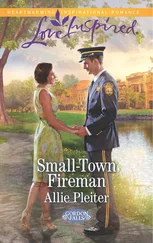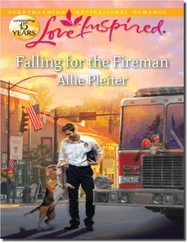“Don’t leave like that, Maria. Don’t do that.” The knife buried in her ribs twisted harder when he called her by her mother’s name.
“He was fine until a minute ago, really,” the nurse said.
Melba nodded, shifting to place herself in her dad’s line of vision. “I’m here. I just left for a second but I’m back now.”
Her father’s eyes found her, the trembling grip on her hand tightening. “Maria.”
Melba swallowed. It seemed so cruel to correct him when he got like this. “It’s okay,” Melba whispered to the nurse. “I think he’ll settle down now.”
She felt the nurse’s hand on her back. “He is better than he was yesterday, remember that.” They’d done this more than a few times since Mort had been admitted with fevers two days ago. “I’ll come back with the evening sedative in about an hour.”
The nurse left and Melba sank onto the bed’s edge, weary. She stroked her father’s right hand, hating the blue-black bruises. They’d moved the IV needle to his left hand yesterday when he’d pulled it out of his right hand.
“I’m sick.” His voice took on a frail, childish quality that opened a black hole in Melba’s stomach.
“Well, yes, you caught some kind of bug, but the fever’s almost gone so you’ll go home soon.”
“It’s wrong, Maria.”
“Nothing’s wrong, Dad. You should go to the hospital when you’re sick. It’ll be fine by tomorrow, you’ll see.”
“Maria, I’m telling you, it’s wrong. She needs to know.”
She dismissed the useless reply of “But I’m Melba, Dad,” and kept stroking his hand instead. “Tell her what?”
Dad grew agitated, his mouth working for the words. He seemed to lose words so much more now, and that seemed so cruel—he was still two years shy of sixty. “I hate that she’s not mine.” He moaned it, as if the words broke his heart in half. Melba froze, the strength of his regret grabbing at her, forcing her attention as much as the clutching grip he had on her hand. “She ought to know she’s not mine. It’s wrong. It has to be fixed. We need to tell her, Maria.” Anger narrowed his eyes and he shook Melba’s arm with every word.
Melba’s blood ran as cold as her father’s hand. Not mine? What did that mean? He couldn’t possibly be saying what she thought, could he? The knot of worry in her stomach hardened to a dark ball of suspicion, but she tried to push it away. Such a thing wasn’t possible. Dad wasn’t himself. She shook it off, just as she’d shaken off the irrational fear that he’d somehow not survive a simple bout of the stomach flu. The man in front of her was Dad. Weak, confused, but Dad all the same.
“Keeping it from her was a mistake.” The bark of command came back to his voice, iron-strong out of a man who had looked yesterday as though he were made of paper. “Why can’t you see that?” He rattled her hand for emphasis. “Where’s Melba? Find her. I’ll tell her myself if you won’t.”
The dark suspicious knot began to pull tighter. This was not one of Dad’s “wanderings,” the wishful conversations Mort invented with Melba’s mom, gone two years now. He’d gotten angry before, but it was always a generalized, frustrated anger, never clear and pointed like this. This had another tone altogether. It seemed almost like he was remembering a real problem he and her mother had struggled with—an argument they had actually had. But the things he was saying didn’t make any sense. She had no idea what to do with his strange actions or his words.
“I’m here, Dad, I’m right here.” Melba peeled the clenched gray hand off hers and stroked it until the fist softened. She needed this strange tormented man to go away, needed Dad to come back and tell her that nothing was amiss. “I’m your daughter. I’m Melba. I’m right here.”
Her voice saying her own name seemed to pull him from the fog. Dad’s narrowed eyes softened in affection and recognition. His whole countenance changed as if the last thirty seconds had happened to someone else. As relieved as she was to see the change, it disturbed her, too. She’d done loads of research, trusted Dad’s doctors, and had three friends whose parents were living with the same disease. She’d thought she was prepared. Still, the split-second change of his emotions always pummeled her. Alzheimer’s was like an invitation into a house of mirrors, never knowing which face belonged to the Dad who loved her and which belonged to the fast-aging man who didn’t recognize her. There had been days lately where it seemed he lost his bearings midsentence.
“Where’s your mother, Melba?” His kindness and clarity startled her—where had it been a moment ago? Why now and not the dozen other times she’d told him who she was? “I need to talk to your mother.”
He’d become reconnected and yet still not quite back to reality. The emotional whiplash rattled her again, compounded by what she’d just heard. Or thought she heard. Or shouldn’t hear. She wanted to throw her hands up in panicked frustration, but kept still. Who knew what she’d just heard or if it meant anything at all? “Mom’s been gone two years, Dad, remember?” She tried to keep her voice soft and reassuring, despite her thundering pulse. She made herself ask, “What did you need to tell her?”
Dad’s brows furrowed in sad confusion. “I forget. I forget she’s gone, you know?” He seemed like a wayward child seeking forgiveness, aware he’d done something wrong but unable to say what. Somehow the disease had taken a giant leap forward during these three days, scaring him as much as it scared her.
Dad’s attention wandered off. She watched his thumb absentmindedly rub the ring finger on his left hand, searching for the wedding band the hospital had asked her to remove along with his watch when he was admitted. The ring had still been warm from his hand when she’d slipped it on her thumb for safekeeping and she’d kept it on since. Did he even recognize it was missing? Did he even notice its odd home on her right hand as she touched him? “I know, Dad.” Melba fought back the lump in her throat—and the roiling in her stomach—to force brightness into her voice. “Hey, it’s just us pals now, remember?”
The phrase never failed to bring a broad smile. “Just us pals now.” He looked around the room as if he’d just entered instead of been here three days. “Let’s go home. I don’t need all this junk.”
“All this junk” was Dad’s catch-all term for everything medical, and he had lots of “junk” these days. Too much. She’d spent nearly a year ignoring the red flags of warning that began a while after Mom died; the missed date here or the lost word there. A few months ago those flags refused to be ignored as it became clear Dad wasn’t just pushing sixty, he was sick. Getting sicker. Packing up her Chicago life to move back home felt like diving into a bottomless black pit, but she’d known it was the right thing to do. More than just “honor thy father,” she loved him, shared his loneliness now that Mom was home in Heaven. Sure, it was difficult—and so painfully early for a man as vibrant as her father—but Melba never doubted the choice. She was exactly where she was supposed to be. From now on, it was going to get harder. Somewhere in the back of her mind she knew she’d think of this day as “the day it started getting worse.” Her stomach rolled and she felt ill instead of hungry.
“Doc Nichols says you do need all this junk. At least for a bit. That flu hit you pretty hard, and he wants you stronger before he lets you go home.”
“I’m fine.”
Melba raised her eyebrows and pointed to the IV line. “Oh, really?”
“I’ll be fine once they unplug me from this getup.”
Читать дальше












